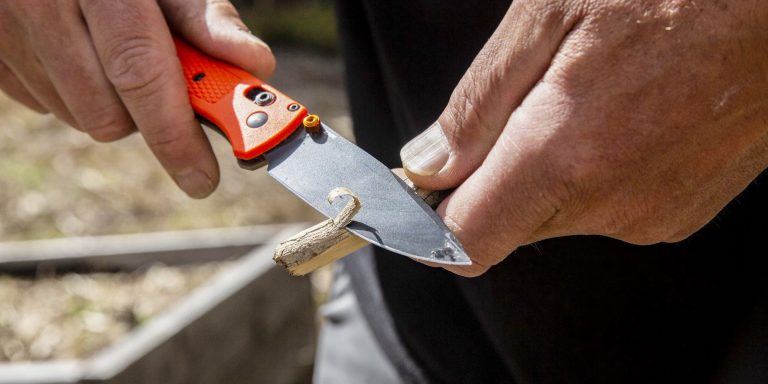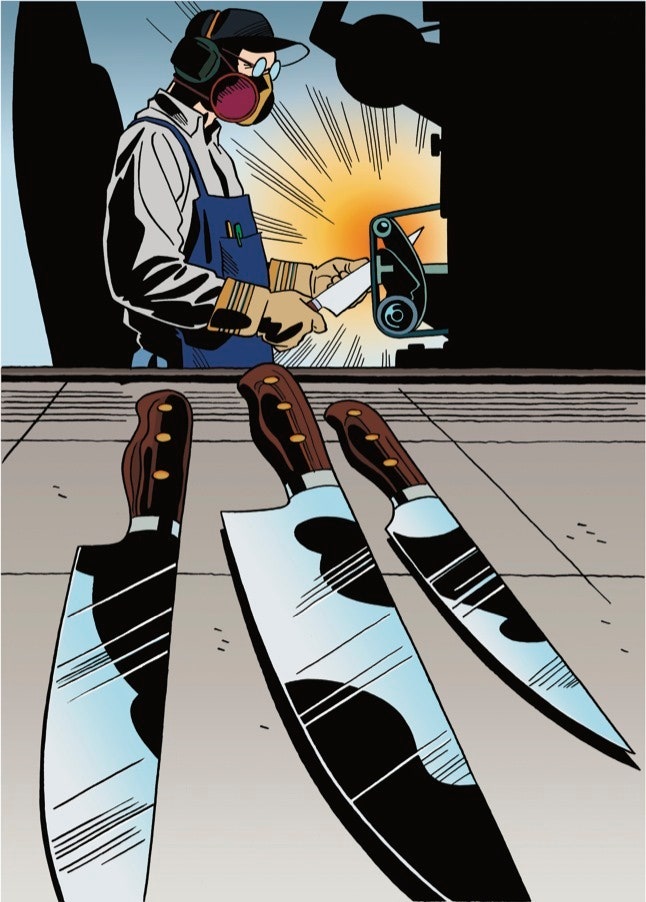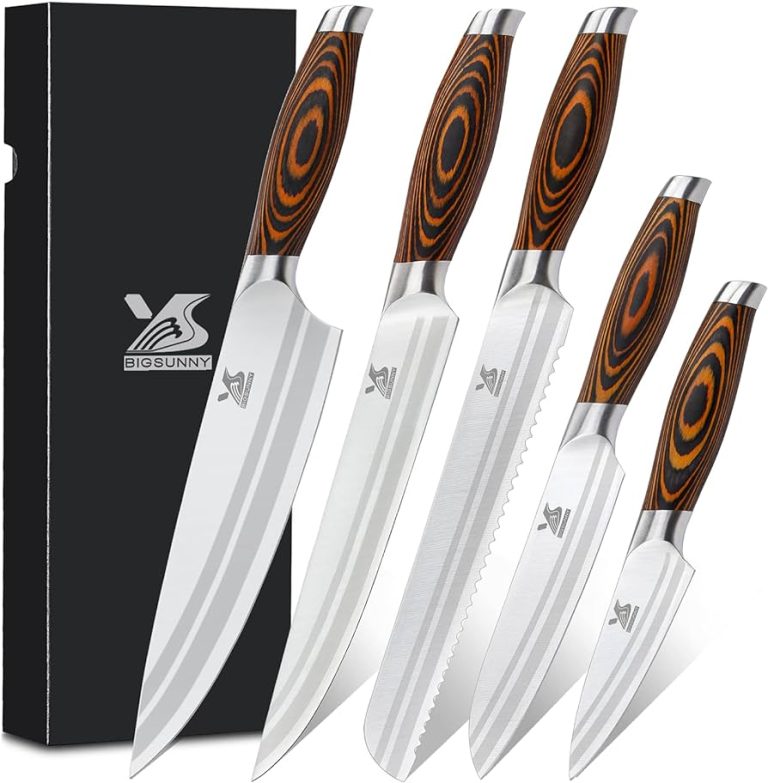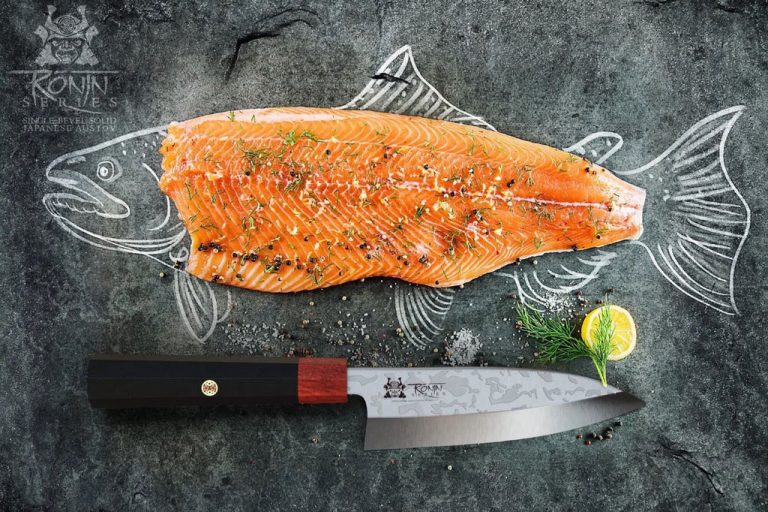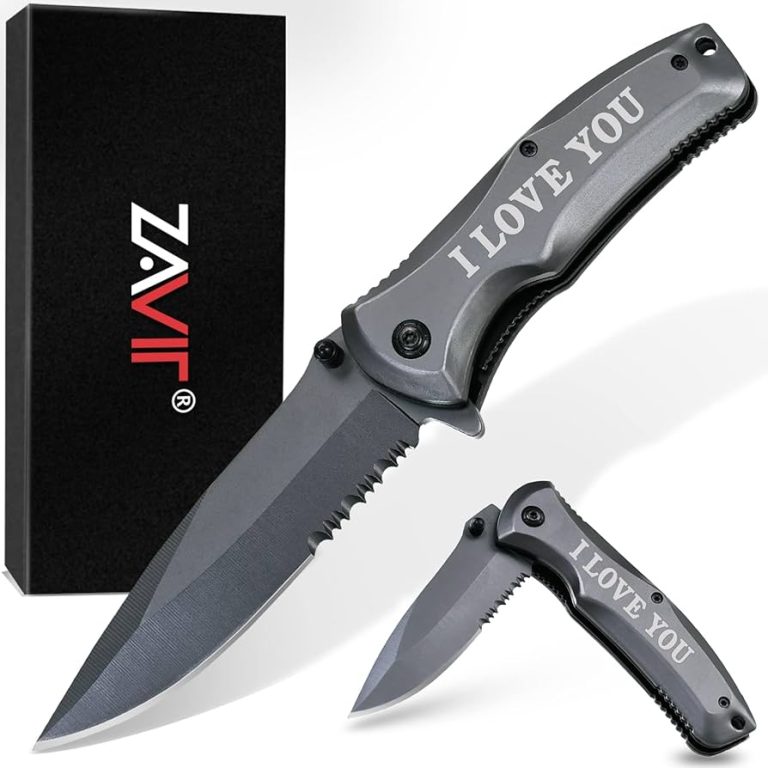What Is a Damascus Chef’S Knife?
A Damascus chef’s knife is a high-quality, handcrafted knife known for its exceptional sharpness and beautiful patterned blade. The Damascus chef’s knife is a sought-after culinary tool renowned for its superior sharpness and unique allure.
Crafted with meticulous attention to detail, this knife is a masterpiece of both form and function. The blade is forged using the ancient Damascus technique, which involves repeatedly folding and layering different types of steel to create a stunning, patterned appearance.
This process also results in a blade that is remarkably sharp, durable, and resistant to corrosion. The Damascus chef’s knife is a favorite among professional chefs and home cooks alike, as it effortlessly glides through various ingredients with precision and ease. Its ergonomic handle ensures a comfortable grip, making it a joy to use in the kitchen. Whether you’re slicing, dicing, or mincing, a Damascus chef’s knife is a must-have tool for any culinary enthusiast seeking the perfect balance between artistry and functionality.
What Is A Damascus Chef’S Knife?
A Damascus chef’s knife is a type of knife known for its exceptional quality and craftsmanship. It is named after the ancient city of Damascus, where this technique of blade-making was first developed. The origins and history of Damascus knives can be traced back to the Middle Ages, with Damascus steel being highly prized for its strength and sharpness.
What sets Damascus chef’s knives apart are their unique features and characteristics. These knives are created by forging multiple layers of steel, resulting in a beautiful pattern on the blade known as the Damascus pattern. This layering not only enhances the knife’s aesthetic appeal but also contributes to its durability and cutting performance.
Using a Damascus chef’s knife comes with several advantages. Firstly, its sharpness allows for effortless slicing and precision cutting, making it a perfect tool for professional chefs and cooking enthusiasts alike. The blade’s strength and resilience ensure that the knife remains reliable and long-lasting, even with extensive use. Additionally, the Damascus pattern on the blade adds a touch of elegance to the knife, making it a prized possession for many culinary enthusiasts.
Understanding The Construction Of A Damascus Chef’S Knife
Understanding the construction of a Damascus chef’s knife A Damascus chef’s knife is a type of blade known for its exceptional quality and beauty. It is constructed using a process called forging, which involves layering different types of steel to create a strong and durable blade. The process of forging a Damascus chef’s knife:
Overall, a Damascus chef’s knife is a testament to the skill and artistry of the bladesmith. Its construction process ensures a blade that is not only visually stunning but also incredibly sharp and durable, making it a prized tool for professional chefs and cooking enthusiasts alike. |
Exceptional Sharpness And Durability
A Damascus chef’s knife is known for its exceptional sharpness and durability. The superior cutting performance of a Damascus blade is a result of its unique construction. The blade is made up of multiple layers of high-quality steel that have been forge-welded together. This process creates a distinct pattern on the blade’s surface, known as the Damascus pattern. Not only does this pattern lend an aesthetic appeal to the knife, but it also enhances its cutting ability.
One of the key advantages of a Damascus chef’s knife is its long-lasting edge retention. The multiple layers of steel ensure that the blade remains sharp for an extended period. This allows chefs to work with precision and efficiency, without the need for frequent sharpening.
In addition to its sharpness, a Damascus chef’s knife is also highly durable. The construction of the blade provides added strength and resilience, making it resistant to wear and tear. This durability ensures that the knife can withstand the rigors of daily use in a professional kitchen.
Aesthetic Appeal And Craftsmanship
A Damascus chef’s knife is a culinary tool that combines aesthetic appeal and craftsmanship. The beauty of the pattern on a Damascus chef’s knife is truly captivating. Crafted using a centuries-old technique, these knives are prized for their intricate patterns that result from the layering and folding of multiple types of steel. The artistry and skill involved in creating Damascus knives is remarkable, with master blacksmiths meticulously forging each blade. This attention to detail not only enhances the visual appeal but also contributes to the knife’s exceptional durability and sharpness. Beyond their functional use, Damascus knives hold collectible value and have the potential to become cherished heirlooms. Their unique patterns, combined with the craftsmanship, make them sought after by knife enthusiasts and collectors. Whether you are a professional chef or an avid cooking enthusiast, owning a Damascus chef’s knife is an investment in both functionality and beauty.
Versatility And Functionality
A Damascus chef’s knife is a versatile and functional tool that is essential for every kitchen. With its multiple applications, this type of knife can handle a wide range of tasks with ease. From slicing and dicing to chopping and mincing, a Damascus chef’s knife can handle it all.
What sets a Damascus chef’s knife apart is its different blade designs and styles, each crafted for specific tasks. Whether you need a curved blade for precise cuts or a straight blade for efficient slicing, there is a Damascus chef’s knife that suits your needs.
In addition to its various blade designs, a Damascus chef’s knife is also known for its versatility in various culinary techniques and ingredients. Whether you are working with meat, vegetables, or fish, this knife can handle the job effortlessly.
Investing in a high-quality Damascus chef’s knife not only enhances your cooking experience but also ensures precision and efficiency in the kitchen. So, if you are looking to elevate your culinary skills, a Damascus chef’s knife is a must-have tool for any chef.

Credit: www.cutleryandmore.com
Proper Maintenance And Storage
Proper Maintenance and Storage:
For a Damascus chef’s knife, proper maintenance and storage are crucial to preserving its quality and longevity. Cleaning and drying techniques play a significant role in this regard. When cleaning the knife, it is best to use warm soapy water and a soft cloth to gently wipe away any residue. Avoid using abrasive cleaners or scrubbers that could damage the blade. After cleaning, ensure that the knife is thoroughly dried to prevent any moisture from causing rust or corrosion.
The Importance of Regular Sharpening and Honing:
Regular sharpening and honing are essential for a Damascus chef’s knife. Sharpening helps to maintain the knife’s sharp edge, ensuring effortless and precise cutting. Honing, on the other hand, realigns the blade’s edge, keeping it straight and efficient. It is recommended to use a quality sharpening stone or honing rod specifically designed for Damascus knives. By incorporating regular sharpening and honing into your knife care routine, you can enjoy optimal performance and extend the lifespan of your Damascus chef’s knife.
Safe Storage Options to Preserve the Knife’s Condition:
When storing a Damascus chef’s knife, it is important to choose safe and suitable options that protect the blade from damage. Consider investing in a knife block, magnetic strip, or knife sheath to keep the knife securely stored. These options not only prevent the knife’s edge from coming into contact with other objects but also minimize the risk of accidental cuts or injuries. Additionally, ensure that the knife is stored in a dry and well-ventilated area to prevent moisture buildup. Proper storage practices will help preserve the knife’s condition and ensure its longevity.
Handling And Usage Tips
Handling and Usage Tips A Damascus chef’s knife is a prized possession in any kitchen, but it requires proper handling and usage to maintain its quality and longevity. Here are some important tips:
|
Conclusion
To sum up, a Damascus chef’s knife is not just a kitchen utensil; it is a work of art that combines functionality and beauty. With a rich history rooted in ancient sword-making techniques, these knives are prized for their exceptional sharpness, strength, and durability.
The distinctive pattern on the blade not only adds aesthetic appeal but also creates a non-stick surface for precise and smooth cutting. Damascus knives are crafted using a meticulous process of layering and welding different types of steel, resulting in a blade that is not only visually stunning but also possesses superior performance and long-lasting quality.
Whether you are a professional chef or an amateur cook, owning a Damascus chef’s knife can elevate your culinary experience to new heights. Its exquisite craftsmanship and unparalleled cutting ability make it a must-have tool for anyone passionate about cooking.
So, why settle for an ordinary knife when you can experience the unmatched quality and elegance of a Damascus chef’s knife?

